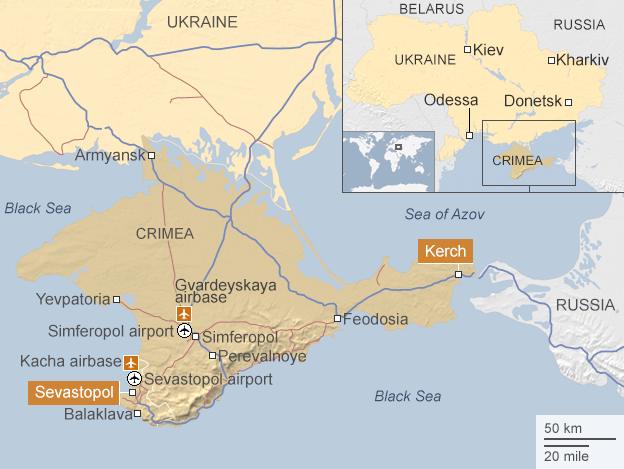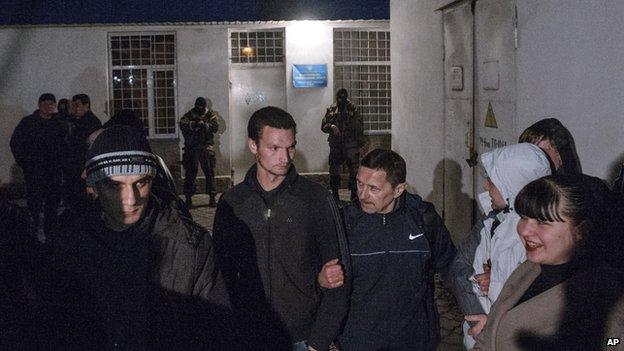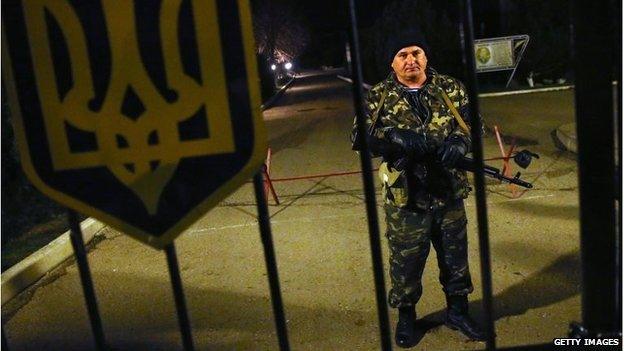Russia keeps pressure on Ukraine with Crimea stand-off
- Published
Russian troops fired into air as Ukrainians march on Crimean airbase
Russian and Ukrainian troops in Crimea are involved in a tense stand-off but fears of an imminent Russian assault have eased.
Ukraine's main military bases on the peninsula remain surrounded by Russian forces. Thousands of Russian troops have been pouring into Crimea.
An alleged ultimatum for Ukrainian forces to surrender - denied by Moscow - expired without incident.
Russia says its troops went in upon a request by the ousted president.
Viktor Yanukovych asked Russia to send troops across the border to protect civilians, Moscow's UN envoy Vitaly Churkin told the Security Council.
He said Mr Yanukovych had written to Russian President Vladimir Putin on Saturday.
Meanwhile, Russian troops who were on exercises in western Russia, near the Ukrainian border, have been ordered back to barracks after completing their tasks, the Kremlin says.
Up to 150,000 personnel were involved in the exercises, which started last week.
The BBC's Richard Galpin in Moscow says the exercises had fuelled fears that Russia was preparing its armed forces for a full invasion of Ukraine.
Ukraine's economy relies on Russian gas - and on Tuesday the head of Russia's gas monopoly Gazprom, Alexei Miller, said that from April Ukraine would no longer get discounted gas, because it had violated its agreements.
In Crimea, two Ukrainian warships are reported to be blocked by a Russian minesweeper in the port of Sevastopol.
The Ukrainian navy headquarters in the city was surrounded by pro-Russian gunmen and civilians, who formed a human chain.
And at Crimea's Belbek air base in Sevastopol, pro-Russian troops who have seized it fired warning shots into the air to prevent around 300 Ukrainian soldiers approaching, the Associated Press news agency reports.

Ukraine's UN envoy Yuriy Sergeyev says Russia has deployed about 16,000 troops to the peninsula.
An alleged 03:00 GMT Russian deadline for Ukrainian forces in Crimea to surrender passed without the feared assault.
Ukrainian military personnel besieged in their bases had a nervous wait, many of them preparing for an attack.
A deputy commander at one of Ukraine's units, named only as Major Lisovoy, told local ATR TV that "we're all in high spirits, ready to defend our base.
"There was no official ultimatum, it was done indirectly via mobile phones."
On the diplomatic front, Russian Foreign Minister Sergei Lavrov is expected to meet the EU foreign policy chief, Catherine Ashton, in the Spanish capital Madrid on Tuesday.
And US Secretary of State John Kerry is on his way to Kiev to meet Ukraine's new leaders and show support for the country's sovereignty.

In Sevastopol pro-Russian activists formed a human chain outside the Ukrainian Navy headquarters overnight

Surrounded Ukrainian soldiers had a nervous wait - but the Russian deadline passed without incident
The Kremlin has established de facto military control in Crimea. There are growing fears that it might try to seize more land in eastern Ukraine, where a number of people support closer ties with Moscow.
Ukrainian officials say reports suggest there is also a Russian military build-up near Ukraine's eastern border.
Crimea, Ukraine's autonomous republic, and several cities in south-eastern Ukraine have been rocked by instability since Mr Yanukovych was ousted last month.
The crisis erupted last November when Mr Yanukovych rejected a far-reaching trade and association pact with the EU, preferring closer ties with Moscow instead.
More than 100 people were killed in clashes between anti-Yanukovych protesters and police in Kiev, many of them protesters shot by snipers.
Russia is pushing for the crisis to be resolved by returning to an agreement signed in Kiev last month, which was overtaken by events.
Moscow wants the current government in Kiev to be replaced by a broad coalition representing what it calls all political forces in the country, with presidential elections being held in December.
The Kremlin has argued in favour of its military intervention, which has sparked outrage and threats of economic sanctions from the US and EU, including possible travel bans and targeted economic measures.
The Pentagon said it was putting on hold all military-to-military engagements between the US and Russia. These include exercises, bilateral meetings, port visits and planning conferences.
However, a Pentagon spokesman said that "there has been no change to our military posture in Europe or the Mediterranean".
And a British official was photographed holding policy documents that suggest the UK will not seek to curb trade with Russia or close London's financial centre to Russians.
Russia says ousted Ukrainian President Yanukovych asked for military aid